Roundtable
We propose a final roundtable to discuss together the conference topics, with contributions from inside and outside academia
🗣
We will discuss with:
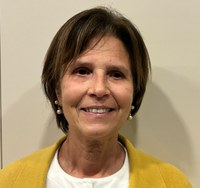
Amalia A. M. Amato
Amalia A. M. Amato is Associate Professor at the Department of Interpretation and Translation (DIT) of Bologna University at Forlì Campus where she teaches “Theory and practice of Interpreting”; “Interpreting from English into Italian” in both simultaneous and consecutive mode, “Multimodality in Interpreting” in the MA Programme, and “Dialogue Interpreting in Healthcare and Medical Settings” and in the BA Programme.
She has taken part as national coordinator and as participant in five different EU-funded and national research projects from 2012 to 2021 dealing with: pre-trial interpreting in criminal proceedings, interpreting for children in legal settings, interpreting in health and medical emergency calls, interpreting for unaccompanied foreign children and asylum seekers in migration and refugee settings. Her research interests also include: interpreter education and training, assessment of interpreting as a process and a product and media interpreting. She has delivered over 30 presentations and seminars both at national and international level and is the author, co-author and co-editor of 4 books and authored over 30 publications and chapters in peer reviewed journals and books.
She is a member of AIIC (International Association of Conference Interpreters), ITI (Institute of Interpreting and Translation), CIOL (Chartered Institute of Linguists), IprA (International Pragmatics Association), AItLA (Italian Association of Applied Linguistics) and AIA (Italian Association of English Studies).
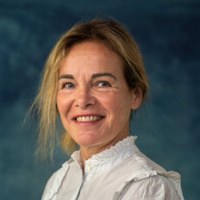
Giulia Bencini
Giulia M. L. Bencini is Associate Professor in the Department of Interpretation and Translation (DIT) at the University of Bologna, Forlì campus. Her research lies at the intersection of usage-based linguistics and psycholinguistics, focusing on how language is represented, acquired, and processed in both children and adults. She aims to bridge the gap between theories of language representation and language processing by integrating laboratory-based experimentation with insights from both formal and functional linguistics. Dr. Bencini earned her PhD in Linguistics from the University of Illinois at Urbana-Champaign in 2002. Her work has explored the representation and processing of argument structure constructions in English-speaking adults and children, and more recently, in bilinguals and second-language learners. She has also examined cross-linguistic patterns of language impairment in adults with acquired language disorders and neurodegenerative diseases.
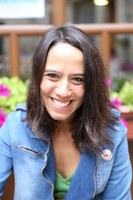
Olga Castro
Olga Castro is 'Beatriz Galindo' distinguished senior researcher at the Universitat Autònoma de Barcelona, Spain, and Reader in Translation and Transcultural Studies at the University of Warwick (on leave, 2024-2027).
She is co-founder and editor-in-chief of the journal Feminist Translation Studies (Taylor & Francis) and has published extensively on the social and political role of translation in the construction of gender and national identities, with a particular focus on transnational feminism, multilingualism, self-translation and stateless cultures in Spain. She is currently Co-PI of the “Feminist Translation Network” project, funded by the AHRC, and member of the “Translation and Reception of Contemporary Feminisms in Catalonia” project, funded by the Solidarity Fund UAB.
In the UK, she organised the summer school “Warwick School of Feminist Translation” in 2022 and was founder and Vice-President of the Association of Programmes in Translation and Interpreting of Great Britain and Ireland. She is also corresponding member of the Royal Galician Academy.

Laura Fontanella
Laura Fontanella is translator, editor, additional writer, transfeminist activist, as well as editor at Mana Project Studio. Creator of the intersectional translation workshop Gender in Translation, she has published Il Corpo del Testo (Asterisco Edizioni, 2019) and Perdere il Filo. Esperienze collettive di traduzione transfemminista (Meltemi, 2024). She has written for Routledge, appearing in The Routledge Handbook of Translation, Feminism and Gender, and within the volume Politics of Bisexuality (ETS Edizioni, 2023), edited by A. Castro.
For Luiss University Press she translated into Italian Transgender History, by Susan Stryker, and for Mimesis Exposed: Environmental Politics and Pleasures in Posthuman Times, by Stacy Alaimo. She collaborates with the publishing house Settenove, and edited the translation of the volume Can We Talk About Consent? by Justin Hancock, and A Damsel Not in Distress!, by Bethan Stevens, nominated for the Inge Feltrinelli 2024 prize.
Within the gaming world, she has translated for several publishing companies, including, in addition to Mana Project Studio, Grumpy Bear and Need Games. Among others, she translated Wanderhome and Wildsea - respectively awarded RPG of 2023 and 2024. In 2025, she developed and co-wrote the role-playing game Elder Mythos with Marta Palvarini.
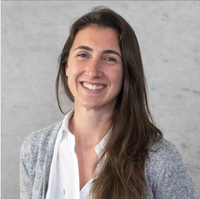
Andrea R. Leone-Pizzighella
Andrea R. Leone-Pizzighella (Ph.D., University of Pennsylvania) is a discourse analyst and educational linguist with an interest in language ideologies and policies in secondary education contexts. She is currently a Marie Skłodowska-Curie Fellow at Eurac Research in Bozen-Bolzano, Italy, where she is developing an Open Access website of teaching videos and transcripts from her fieldwork at two middle schools.
Her research at these middle schools—focused on school rituals, classroom interaction, and language ideologies—is a "prequel" to her PhD research at three secondary schools in Umbria, where she studied the ways that students are socialized to participate in everyday school life.
She discusses this research in her book, Discourses of Student Success: Language, Class, and Social Personae in Italian Secondary Schools (Routledge Studies in Linguistic Anthropology, 2021). She welcomes correspondence at aleonepizzighella@eurac.edu.
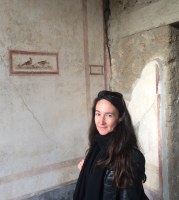
Selby Wynn Schwartz
Selby Wynn Schwartz is the recipient of the 2025 Joseph Brodsky Rome Prize in Literature at the American Academy in Rome and a 2024 Fellowship in creative writing from the Dora Maar Cultural Center in Ménerbes. She is the author of After Sappho (Galley Beggar Press), which was longlisted for the 2022 Booker Prize and shortlisted for the 2023 Orwell Prize in Political Fiction, the 2023 James Tait Black Prize in Fiction, and the 2024 Edmund White Award for Debut Fiction; it has now been translated into eleven languages.
Her first book, The Bodies of Others: Drag Dances and Their Afterlives (University of Michigan Press), won the 2020 Sally Banes Prize from the American Society of Theatre Research; her novella A Life in Chameleons (Reflex Press) received the 2021 Reflex Press Novella Award.
She holds a Ph.D. in Comparative Literature from UC Berkeley.